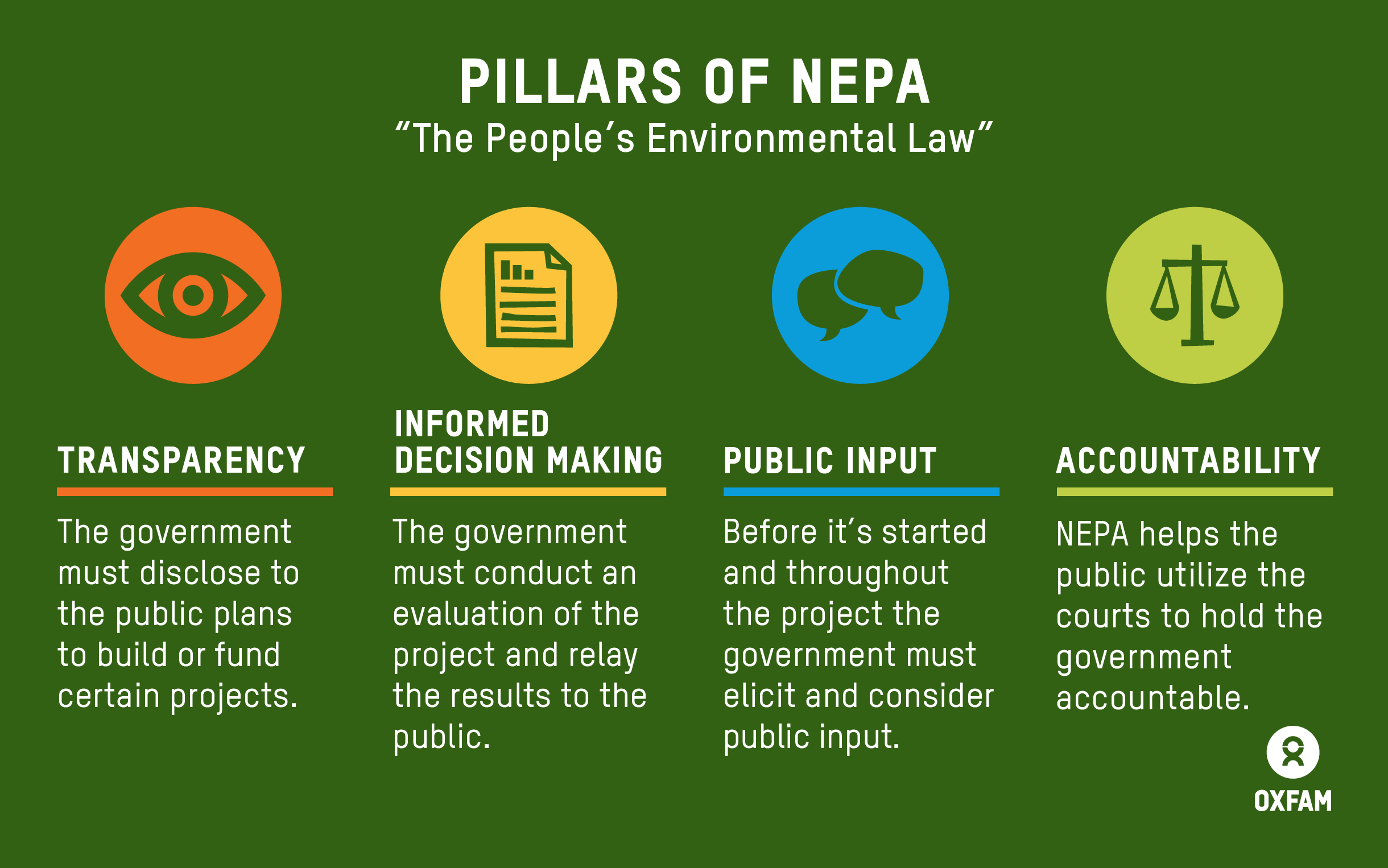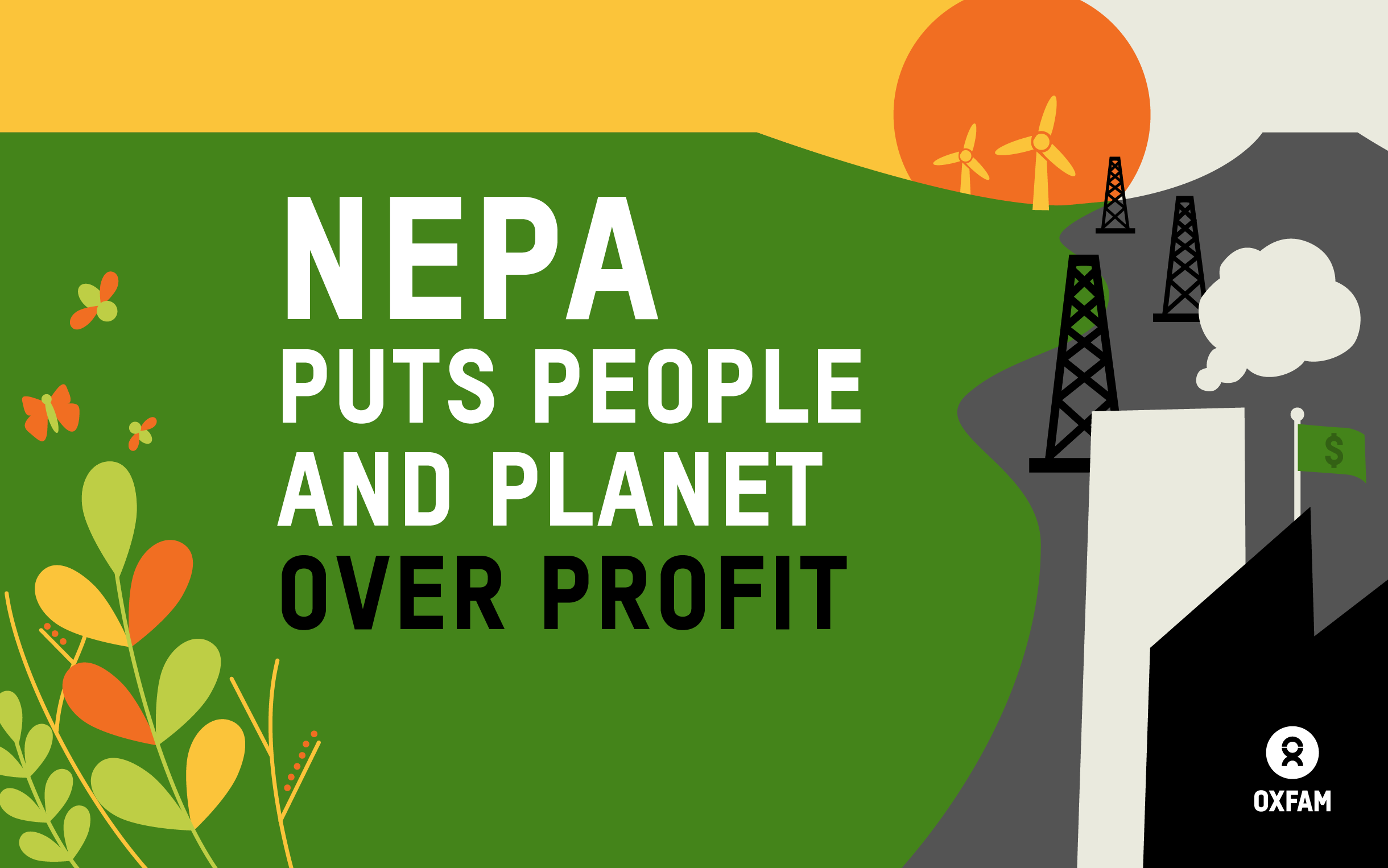The National Environmental Policy Act (NEPA) helps prevent greedy corporate polluters from exploiting marginalized communities.
Marginalized communities face the worst impacts of climate change and are the most frequently exploited by corporate polluters. For example, people of color in the US face a greater burden of air pollution than white people because dirty energy projects are disproportionately placed near communities of color. Due to particulate matter from automobile fumes, smog, soot, oil, smoke, ash, and construction dust that is harmful to both people and the environment, people of color, but particularly Black people, die from preventable diseases at a higher rate.
The National Environmental Policy Act, aka the “People’s Environmental Law”, is a significant tool for combatting this kind of harm, because it ensures that federal agencies consider the impacts of climate change and take community input seriously before implementing any new projects. Its reach across federal government agencies can protect BIPOC communities and disincentivize the proposal of projects – from highway expansions to pipelines and power plants -- with high emissions potential or that violate human rights.
Here are 3 ways that NEPA has protected BIPOC communities in the US:
New Mexico’s Chaco Canyon was protected from oil and gas leases
In New Mexico’s Chaco Canyon, Indigenous communities have been fighting for years to stop permits for fracking in that area. Using NEPA and the National Historic Preservation Act, the Diné called on the federal government to protect their communities and land.
In 2019, the court sided with the local communities, holding that NEPA had been violated because the government’s analysis failed to consider the cumulative impacts on water and air pollution of nearly 4,000 fracking wells leased out around Chaco Canyon—a crucial win for Diné communities in New Mexico. In 2021, President Biden proposed a 20-year ban on new drilling within a 10-mile radius of Chaco Canyon, after years of tribal requests to preserve the vast area of pre-Columbian ruins.

Louisiana’s Formosa Plastics Petrochemical Complex paused
In St. James, Louisiana—a predominately Black community on the Mississippi River, Formosa Plastics submitted plans to build a 2300-acre plant on top of two plantations that housed ancestral burial grounds important to that community. Formosa Plastics already has a history of problems and damage to local communities, including a fire at its Texas plant which burned for five days.
Along with lawyer advocates, a women led local community group called RISE St. James, used NEPA to challenge the Army Corp of Engineers (Corps) claim that the plant would have no significant impact on the environment. Environmentalists found that the new Formosa plant was estimated to release the equivalent of three coal-fired power plants worth of greenhouse gasses in the area. In 2021, the Corps agreed to conduct a full review and new analysis of the plant, an important victory for the St. James community.
Virginia’s Atlantic Coast Pipeline canceled
The Atlantic Coast Pipeline was part of a multi-billion-dollar project by Duke Energy and Dominion Energy to bring a natural gas pipeline over 600 miles from West Virginia to North Carolina, crossing multiple national forests and the Appalachian Trail in Virginia. The compressor stations—pumping centers that would significantly reduce air quality—for the pipeline were sighted to be placed in predominantly Black communities, and the runoff from the pipelines threated the Chesapeake Bay Watershed.
Because of NEPA, the Federal Energy Regulatory Commission (FERC) was required to conduct an environmental analysis. However, FERC repeatedly approved the pipeline without determining the climate impacts of the project. The Chesapeake Bay Foundation and the Southern Environmental Law Center sued FERC for failing to properly adhere to NEPA’s standard, and in 2021 the pipeline was cancelled.

Oxfam advocates for climate action to protect the rights and livelihoods of people most affected by the climate crisis, while holding greedy corporate polluters accountable for the harm they are doing to the planet. NEPA is a crucial piece of this, and strengthening this law could make a huge difference for communities and the planet. NEPA has the potential to be one of the most significant environmental laws in the country, protecting BIPOC communities, ensuring those on the frontline of climate change have a seat at the decision-making table, and challenging projects with high emissions potential, or that violate human rights.
Join us in pushing the Biden administration to do more to protect and strengthen the National Environmental Policy Act so that we can put clean projects ahead of dirty projects, and people and the planet over corporate profits.
The choices that we make now will determine what kind of future we have.
